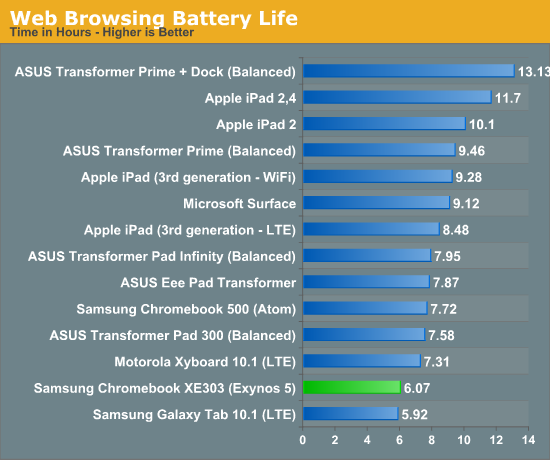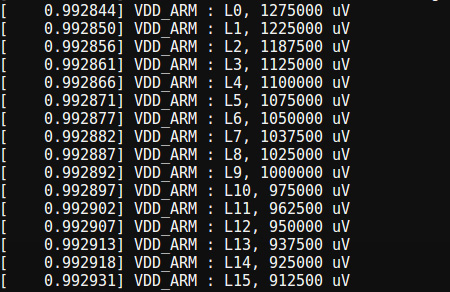Samsung Chromebook (XE303) Review: Testing ARM's Cortex A15
by Anand Lal Shimpi on October 31, 2012 9:00 AM ESTBattery Life & Power Analysis
The final unknown in all of this is power consumption. ARM's Cortex A15 isn't really supposed to be a sipper of power, and when placed in a notebook I don't know that there's a lot we can conclude about how it stacks up to Atom either. Some high level power consumption data would normally help but these two platforms are fairly different:
| Samsung Chromebook Power Consumption Comparison | ||||||
| Display @ 200 nits | Idle | Kraken (Avg) | Kraken (Peak) | |||
| Samsung Chromebook 500 (Atom N570) | 11.53W | 14.4W | 15.2W | |||
| Samsung Chromebook 303 (Exynos 5 Dual) | 6.33W | 10.5W | 11.3W | |||
The new Chromebook consumes considerably less power at idle than its predecessor. The smaller display, simplified motherboard and truly integrated SoC platform are likely all to thank for this. The significant reduction in power also helps explain the big reduction in battery capacity as well.
Under load, the two platforms do see differing levels of additional power consumption. The new Exynos 5 based Chromebook sees a dramatic increase in power consumption under load, hitting 10.5W (a 66% increase over idle) while running Mozilla's Kraken benchmark. The Atom N570 based Chromebook increases power consumption as well, but just not by as significant a degree: ~25%. This actually helps illustrate exactly why Atom wasn't phone worthy in its earlier incarnations. Contrary to popular belief, it wasn't actually peak power consumption that was the problem (a move to 32nm can easily eat into these numbers). The total platform power consumption, particularly at idle, was Atom's real problem in the early days. It also turns out that this is much of what keeps Intel's Core processors from moving into ultra mobile form factors, something that Haswell is supposed to address.
Given that we're dealing with somewhat different panels here, I wanted to see what power consumption looked like if we removed the panels from the equations. I re-ran all of the power data with the display turned off:
| Samsung Chromebook Power Consumption Comparison | ||||||
| Display Off | Idle | Kraken (Avg) | Kraken (Peak) | |||
| Samsung Chromebook 500 (Atom N570) | 8.82W | 11.4W | 12.4W | |||
| Samsung Chromebook 303 (Exynos 5 Dual) | 4.07W | 8.32W | 9.27W | |||
The old Atom based Chromebook uses more than twice the idle power of the new version - it's no wonder Google was able to get away with a battery half the size. Once again however we see a much larger increase in power consumption once the Cortex A15 is under heavy load. Active power consumption more than doubles on the new Chromebook, while we see around a 30% increase on the Atom based system. I do wonder what will have to be done to get the Exynos 5 Dual into a smartphone as an increase of ~4W under load just won't cut it in a phone. The Atom platform shows a 2.6W increase in power under load, which sounds about right for a high clocked 45nm part.

Despite the more power efficient platform, the reduction in battery capacity puts the new Chromebook well below the Atom model in battery life. Our wireless web browsing test put the new Chromebook at just over 6 hours of continuous use on a single charge. For a notebook that's not too bad, but compared to modern tablets it's not good.

The performance gains over Atom (and by extension, the ARM Cortex A9) do give us some indication as to what could be done to get Exynos 5 into a smartphone. By dropping clocks much lower than 1.7GHz Samsung would be able to maintain a performance advantage in a very power constrained device and hopefully keep power in check. The photo above features a list of all of the voltage levels supported by Samsung's Exynos 5 Dual as implemented in the new Chromebook.










149 Comments
View All Comments
jeffkro - Friday, November 2, 2012 - link
You do realize there is a higher end chromebook that runs on a ULV celeron cpu right. If you want better specs it is available.jeffkro - Friday, November 2, 2012 - link
The celeron runs windows pretty fast so you know its lighting fast for chrome OS.agnar150 - Saturday, November 3, 2012 - link
You could not be more wrong. The OS structure is inherently more secure and it is very much more secure than Windows.Wolfpup - Friday, November 2, 2012 - link
How is Windows not safe? I've been using it how long now? Decades? And had exactly zero security intrusions. Being the market leader so you're a big target doesn't mean the platform is less safe-in fact Microsoft takes security a lot more seriously than most closed source software does.As for this unit...it remains ridiculous. I bought a $200 Acer running real Windows 7 on AMD hardware, and it's obviously a bajillion times more functional. This thing runs one single program-Chrome, on low end hardware, doesn't properly support external displays or other devices, can't replace my real PC for...much of anything, and it actually costs as much or more than superior devices...just like the older Chromebooks did.
epobirs - Friday, November 2, 2012 - link
Utter nonsense. There are tons of options for locking down Windows the average consumer doesn't bother with but the information is widely available. Just a few changes makes it far harder for malware to get any value from the machine.The difference is that you still have the full capabilities of Windows and its software library, along with a choice of browsers, including Google Chrome.
The people I know who do serious online financial work wouldn't blink at spending a lot more than $250 to pay someone like me to teach them to lock down their machine for work. Putting up with the limitations of Chrome OS and paying for the privilege would strike them as absurd.
UltraTech79 - Friday, November 16, 2012 - link
"People that do online investing and banking with significant assets" have better options than shitty chrome OS or standard windows. Ridiculous.ddriver - Wednesday, January 9, 2013 - link
Have you actually checked the chrome store? there are plenty of good applications, especially concerning productivity, surely, the overall number of apps is much lower than android, but considering most of those are useless, it is not that big of a deal. You can do plenty of stuff on the chromebook, and that that price point it is a very good bargain.Flunk - Wednesday, October 31, 2012 - link
No, honestly it doesn't. If you need a keyboard you buy one of the ASUS Transformer pads. This is a very limited device that won't get you very far and really doesn't have a reason for existing. If this was just a laptop-like device running android I could see the utility but Chrome OS is basically just a kneecapped version of android.jeffkro - Wednesday, October 31, 2012 - link
Its kneecapped for security, their is a reason for it.klmccaughey - Thursday, November 1, 2012 - link
I would totally agree with this if there was an android with a keyboard and this hardware at this price point. The transformer is good, but it's far too expensive.I got an Ipad 2 by accident, and between that and the laptop I don't think I need anything else. I hate Apple, which makes the whole experience confusing.